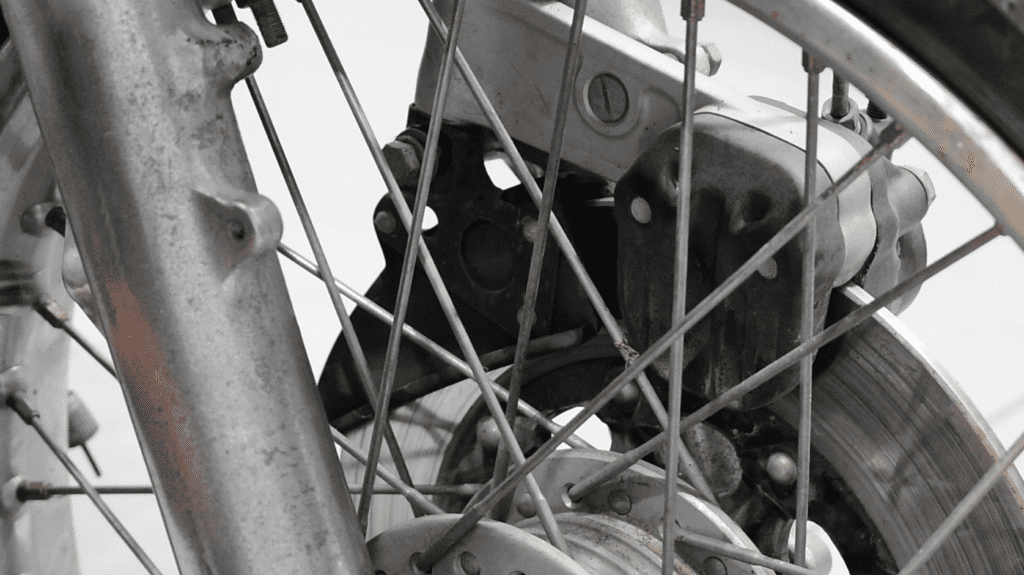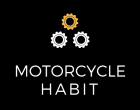
Brake pads are a lifeline to stop your motorcycle properly. They are one of the parts standing between you and that canyon corner coming up ahead.
When braking, there are different kinds of noises that you will hear. Some are considered normal and some can be considered unsafe.
Is it normal for new motorcycle brake pads to rub? It is normal for your new motorcycle brake pads to rub and even make noise while riding or stopping. The sound the new motorcycle brake pads make will vary and the feel of them while riding will likely be a bit different for a while after installation.
Like all things, there are limits to the rubbing a brake pad should experience while riding your motorcycle. We will go over some key points about motorcycle brake pad rubbing in this article.
Why It’s Normal For New Motorcycle Brake Pads To Rub
You are a motorcycle enthusiast and have recently picked up a preowned R1 or a gently used Harley you’ve had your eyes on for a while. On your visual inspection, you notice those brake pads are getting a little short on life. You replace them but now you have a noise that wasn’t there before!
Don’t get too bent out of shape, fellow rider! There are a few reasons why you may have rubbing coming from a new set of brake pads. The biggest factor that is coming into play here is that they are brand new!
Yes, it is a little annoying since these are new pads they should sound just like your used ones.
Your brake pads that you have recently replaced have never touched a rotor in their existence! Unlike the pads you have just taken off, these new brake pads may possibly still have residual chemicals used to preserve them for sale as they sit on a shelf waiting for someone to buy them. Alongside this, the material the brake pads are made of can have an effect on how much they rub after installation.
Motorcycle brake pads, just like any brake pad, will need to have a break-in process performed to ensure that they properly seat with the rotors on your bike. This will be gone through later in the article as well.
We will touch on many reasons why brake pads rub but it is important to understand their rubbing limits as they cannot rub too much. For more information about how often you should be changing your motorcycle brake pads, see our article “How Often Should You Change Motorcycle Brake Pads?”
How Long Will New Motorcycle Brake Pads Rub? At What Point Is Rubbing A Problem?
There are different answers you will come to when you are trying to find out how long these new pads will rub. Taking in a lot of different factors, some brake pads may slightly rub their entire life span on your motorcycle.
Some motorcycles were built for comfort and others for speed. Which of these do you have? The reason why it is important to ask yourself this question is that it may be in the design of your bike to have slightly noisier brake pads. The last thing a Harley wants to do is pull up to the bar with some rotating noise coming from rubbing high-performance brake pads.
Your sports bike and fellow sports bike riders are going to tell you to get the best of the best when it comes to brake pads, so if your brake pads have a slight rubbing noise at the track it’s gonna get people to ask you some questions about which ones you are running and how you like them.
Now you may be thinking, ok, well there’s some noise but there has to be limitations on it. Rubbing brake pads begin to be a problem when there is a loud rubbing that can turn into grinding or rumbling. You may feel this in your brake lever and even your handlebars if it is something serious.
One good test to find out if your brake pads rubbing is normal or not is to put your motorcycle in the service position on stands or a built-in service stand. (I loved my Honda VFR because of the built-in service stand). Without touching the brake lever, give the wheel a spin that you think is rubbing too much. The general rule is if the wheel stops before a full rotation your brake pads may be rubbing too much.
If you have recently purchased a motorcycle and there is a brake pad rubbing noise, inspect those pads asap. If they look like they have a good bit of life left, consider doing the test mentioned above. If they are making a rubbing noise and there is no life left, be sure to replace them and inspect the associated braking parts of that part of the bike for proper operation. Bent wheels, warped rotors, and even sticking brake calipers can be responsible for brake pads rubbing when they aren’t supposed to.
How To Properly Break In Your New Motorcycle Brake Pads
Once you have done a brake job on your motorcycle that includes replacing the brake pads, it is important that you protect your investment in your new parts and ensure many safe rides to come. Breaking in your brake pads papers your brake pads for what they were designed to do, and that is to stop your bike. They need to clamp down on that rotor and bring your bike to a complete stop in some cases a lot faster than you had hoped to stop.
You can break in your new brake pads by doing a series of stops that include coming to a complete stop each time. Be sure that you are in an area where you can do this and not get a ticket or run over by another vehicle. You will want to do at least three to four 35mph-5mph slow downs. When doing this, be sure to slow normally to avoid improper seating of your brake pads.
Then bump it up to 45mph to a good 5mph and roll three to four times. Make sure you are using the brakes that you just replaced during this time. Your rear brake pads will not break in properly if you only use the front brakes in this process.
Once you have done this, you should notice that the rubbing noise has possibly decreased a bit because of breaking in the pads. Most pads will still have a very faint rubbing noise even still because they are only microns away from your rotors.
Why Some Brake Pad Materials Make More Noise Than Others
One of the most common reasons why new motorcycle brake pads rub is the material you have chosen to replace your brake pads with.
Choosing something like an organic compound will cause a little less noise when rubbing but it is because they are a “softer” brake pad than something like a sintered brake pad. Organic pads are cheaper and will cause all kinds of brake dust on your shiny chrome stallions rolling on the front and rear of your motorcycle. They also wear more quickly than other materials and will lack more in the performance category than any other pad material.
Sintered brake pads are made of harder, more durable materials and can cause a bit more normal brake noise while riding. Normal brake pad rubbing noise sounds similar to a very light scrape. If you notice this noise is a very loud scrape after replacing your brake pads you may need some new brake components. These are made for performance and for that reason will last longer but can sound like the brake pads rub more because of their durable design.
There is a happy medium when it comes to brake pads called semi-sintered brake pads. It gives you the best of both worlds when it comes to brake pads and rubbing. They may have a similar rubbing as the Sintered brake pads because of the material but they will be a little smoother when they do rub. They also will not dirty your wheels as quickly as an organic brake pad. They will last longer than an organic brake pad as well as give you well-balanced performance in heat or wet conditions.
While it is important to understand which brake pad works best for you, always remember to break them in. Be sure to follow manufacturer torque specs when tightening down brake components as they too can cause brake pads to rub if they are tightened too tight. Be sure to inspect your brakes and break them in a safe location.
Now you can listen to your brake pads. What are they telling you?
